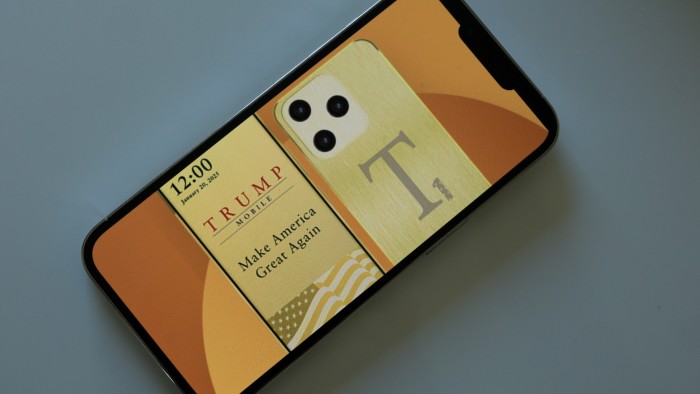The Trump Organization’s bid to enter the smartphone industry with a ‘Made in America’ device and mobile plan has seen it partner with a small network registered at a luxury apartment in the beachfront Trump Tower Miami.
The business led by the US president’s sons Donald Trump Jr and Eric Trump has tapped Liberty Mobile Wireless to help leverage the family’s brand to crack the mobile network market — and to push President Trump’s ambition to bring smartphone manufacturing to the US.
The US president has threatened companies like Apple with 25 per cent tariffs unless they shift production, a logistical challenge that industry insiders say is impractical.
Trump Mobile has now pledged to deliver an American-made smartphone itself. To help accomplish this task, the Trump Organization will rely on the seven year old Florida-based wireless company, rather than more established players.
Liberty Mobile Wireless, which will provide Trump Mobile’s phone plan, was founded in 2018 by an entrepreneur called Matt Lopatin, according to company filings. The company is a ‘mobile virtual network operator,’ a business that buys network capacity from the likes of AT&T, Verizon and T-Mobile and then sells on to customers.
These virtual networks have achieved some success in the US, with companies cashing in on celebrity brands to offer alternatives to the three dominant network providers. One network, Mint Mobile, was fronted by actor Ryan Reynolds and later sold to T-Mobile.
Trump Mobile says its services are “powered” by Liberty Mobile Wireless, and that “its products and services are not designed, developed, manufactured, distributed or sold” by the Trump Organization or its affiliates.
Trump Mobile’s order form crashed after its launch on Monday, which an employee on Wednesday attributed to the rush of inquiries to pre-purchase the Trump phone and sign up to its plan.
Liberty Mobile Wireless’s FAQ page lists five identical entries for the question “What is Lorem Ipsum?” — with the response “Lorem Ipsum is simply dummy text of the printing and typesetting industry.” The company is listed on LinkedIn as having fewer than 50 employees.
Liberty Mobile Wireless did not respond to requests for comment.
The company is registered to an apartment in the Trump Tower luxury condominium in Miami, according to business records. Filings also show its owner, Lopatin, has founded multiple small companies over the years, several of which have since been dissolved.
At an event in New York to launch Trump Mobile, Donald Trump Jr and Eric Trump introduced three executives — Don Hendrickson, Eric Thomas, and Pat O’Brien — who will lead the company, citing the team’s collective “hundreds of years in the mobile space.” Trump Mobile did not provide further details on their background.
The team behind Trump Mobile now faces a daunting task in delivering an American made smartphone by September as promised.
The $499 ‘T1’ smartphone’s “manufacturing is in Alabama, California and Florida”, a Trump Mobile spokesperson said without providing further detail. Eric Trump had previously clarified in an interview that the phones would “eventually” be made in the US.
Todd Weaver, chief executive of Purism, an electronics company founded in 2014 that has been manufacturing smartphones in California, said that he does not think a smartphone with the specifications Trump Mobile has promised can be made in the US.
Building a US supply chain had been a slow, “iterative” process, he said. “When I started, I knew we couldn’t build it immediately. When I was going to put out my first phone, we flew to China to look at all the designs and learn the processes.”
Purism’s devices are currently aimed at more niche customers, such as government agencies, who value its ‘secure’ US supply chain and its proprietary operating system. The trade-off is that Purism’s device does not rival mainstream smartphones with its technical features, and cannot offer the same range of apps as Google’s Android or Apple.
The Trump Mobile website details the specifications of the device, which resembles existing Android smartphones produced by Chinese companies such as Vivo and Umidigi.
The T1 smartphone also enters a segment that has also shrunk in the US in recent years. According to the International Data Corporation, phones in the $400-$600 price segment were less than 5 per cent of the market in 2024, down from 9 per cent in 2019. Apple’s iPhone 16e, launched in February with a $599 retail price, aimed at budget-conscious consumers.
“This is a challenging price segment for smartphone brands to see large volumes, as consumers are either buying very cheap devices or leveraging interest-free financing programmes by carriers in the US,” making it affordable to access more high-end devices, says Nabila Popal at the IDC.
Adding to the challenge is that a formal ‘Made in the USA’ label requires “all or virtually all” of the product to have been made in the USA, according to Federal Trade Commission guidelines, meaning they contain “negligible” foreign components.
“Ultimately Trump Mobile needs to balance its ‘Made in America’ brand claim with the economics of producing something that appeals to a broad segment of the American public,” says Jeff Fieldhack, director of research at Counterpoint Research. “This is a tall order and I’ve yet to see anything that comes close.”
